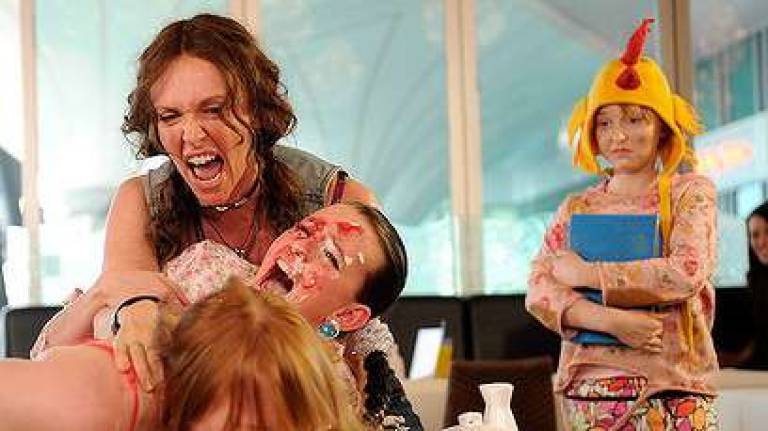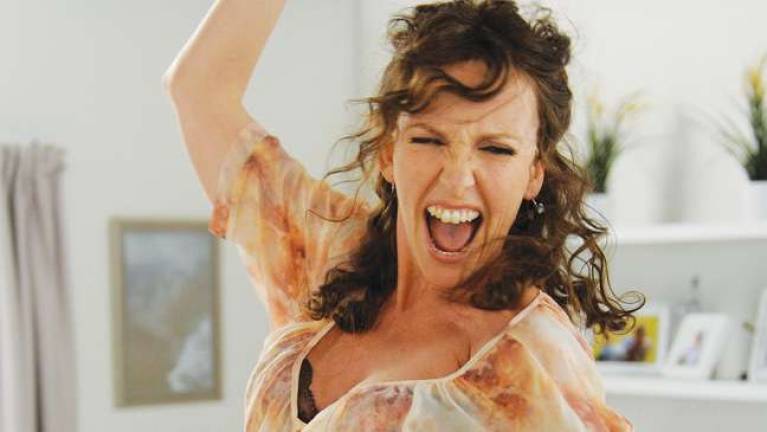Out-loud Outlaw


P.J. Hogan's Mental offers a compassionate screwball masterpiece
P.J. Hogan, Australia's most appealing yet least heralded filmmaker, returns to prominence with Mental, a kind of musical screwball comedy about social misfits that at first seems perfectly designed for the era of "It Gets Better" nostrums. But Hogan is bolder than the politically correct pandering of TV's fatuous Glee and The New Normal or films like The Kids Are Alright; he goes to the heart of social alienation with visionary wildness.
The opening scene of Aussie housewife Shirley (Rebecca Gibney) twirling in the backyard of the suburban home she shares with five daughters and an estranged husband imitates The Sound of Music's extravagant opening. To recognize this berserk parody is to be inside Shirley's disaffection and that's the key to Hogan's unique, antic sensibility. Still twirling, he launches into her household chaos and social rejection, using fast-paced Aussie dialect that may bewilder some before playing his wild card: Shaz (Toni Collette), a heroine-catalyst even crazier than the housewife.
The aggressive Collette, who starred in Hogan's debut film Muriel's Wedding, always suggested a commedia dell arte performer unfortunately stuck in neorealist contexts. She finds perfect placement here as a kind of Mary Poppins who brings balance-self-acceptance and self-defense-to the unfair circumstances of housewifery, motherhood and girlhood. Far beyond a feminist, Shaz declares herself "the avenging angel of the perpetually humiliated." Her vengeance is both funny and scary (especially a menstrual protest that is surreal where Bridesmaids was merely gross). Shaz hates the social order that has wronged her and means to "upset the delicate balance of its vanity." She also recalls Renoir's archetypal anarchist Boudou come to save Shirley and her daughters from drowning in abuse.
Daringly, Hogan always snaps back from Shaz's pain with equally manic humor. Mental is driven by Hogan's identification with the dissatisfaction of social customs ("roles give you cramp" sang Lesley Woods of The Au Pairs). Such emotional affinity also allowed Hogan to achieve his astonishing, adult-worthy version of Peter Pan in 2003 and his superb though little-known Unconditional Love where his underdog compassion was first articulated through the appeal of popular music. Like Britain's Terence Davies, Hogan understands how pop music sustains otherwise inexpressible longings. These artists find depth is what gets dismissed as camp (what TV's Glee diminishes into camp). Mental staves off psychosis through the spirit of out-loud expression.
Shaz is an out-loud outlaw and so is Hogan who depicts Shaz and Shirley's world in ostentatiously vibrant colors. Mental has a frantically optimistic look comparable to Wes Anderson stylization but with an intentionally psychedelic edge-on the verge of a breakdown or break-out. Shirley's teenage daughter's love scene at an amusement park flume ride is a yellow and blue night fantasia reminiscent of the pubescent flying scenes in Peter Pan. (It's balanced by Shaz's own red-tinted underwater trance.) Hogan's sympathy with his male characters (Anthony LaPaglia and a striking Liev Schreiber) also puts him at the forefront of gender issue artists. Gus Van Sant and Todd Haynes can't touch Hogan's egalitarian humanism. He doesn't promise that life will get better without a fight but he is most moving when he uses music as part of the personal-political arsenal. Mental also pays tribute to Stephen Elliott's Rodgers and Hammerstein cult film Welcome to Woop Woop which similarly redefined Down Under identity in pop terms. Shaz does a hilarious monologue on exported pop stars as test mice, satirizing Hogan's native allegiance. It's part of Hogan's emotional abundance and visual daring, gifts that confirm him as a major filmmaker.
Follow Armond White on Twitter at 3xchair